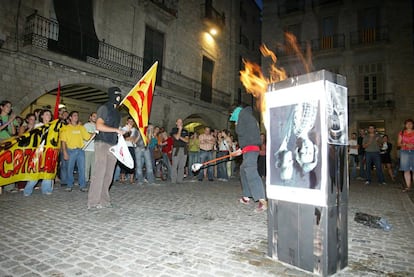In Spain, burning photos should not be a crime
The judgment by the European Court of Human Rights on destroying pictures of the king is welcome in a country that seems determined to erode freedom of expression

A country’s jurisprudence – understood as the collection of judgments rendered by courts of justice – is the result of its laws and its history. In 1985, barely one decade after Spain’s parliamentary monarchy had made its debut, the Supreme Court ruled that burning a photograph of the king was a crime of defamation.
Spanish society and its justice system need to change their criteria regarding this type of behavior
Two decades later, at a Catalan separatist march, two hooded individuals burnt a large, upside-down portrait of the royal couple. The case reached the Constitutional Court, which ratified the sentence against Enric Stern and Jaume Roura. However, the European Court of Human Rights in Strasbourg has just found that burning that photograph did not aim to damage the dignity or reputation of Juan Carlos, but should instead be viewed as political criticism of what the then-monarch represented. Also, the court noted that there were no calls for violence at any time during the incident. In short, the European judges on the panel (including one Spanish judge) found it to be a manifestation of freedom of expression that is guaranteed by the European Convention on Human Rights as well as by the Spanish Constitution.
The implementation of this judgment is an urgent matter. Spanish society and its justice system need to change their criteria regarding this type of behavior, because regardless of the fact that it is rude, uncivil and disagreeable, freedom of expression is a basic tenet of democratic societies.
Criminalizing certain types of behavior is not the best way to defend our democratic institutions
Back at the time, the Constitutional Court itself was divided over the case, but in the end the judges considered to be more conservative prevailed. EL PAÍS welcomes the decision by the Strasbourg court, and views it as a breath of fresh air in a country that is intent on toughening criminal punishments and undermining freedom of expression. Criminalizing certain types of behavior and resorting to the courts abusively to deal with nothing more than provocations and acts of incivility is not the best way to defend our democratic institutions, which by definition should be open to debate and criticism.
English version by Susana Urra.
Tu suscripción se está usando en otro dispositivo
¿Quieres añadir otro usuario a tu suscripción?
Si continúas leyendo en este dispositivo, no se podrá leer en el otro.
FlechaTu suscripción se está usando en otro dispositivo y solo puedes acceder a EL PAÍS desde un dispositivo a la vez.
Si quieres compartir tu cuenta, cambia tu suscripción a la modalidad Premium, así podrás añadir otro usuario. Cada uno accederá con su propia cuenta de email, lo que os permitirá personalizar vuestra experiencia en EL PAÍS.
¿Tienes una suscripción de empresa? Accede aquí para contratar más cuentas.
En el caso de no saber quién está usando tu cuenta, te recomendamos cambiar tu contraseña aquí.
Si decides continuar compartiendo tu cuenta, este mensaje se mostrará en tu dispositivo y en el de la otra persona que está usando tu cuenta de forma indefinida, afectando a tu experiencia de lectura. Puedes consultar aquí los términos y condiciones de la suscripción digital.








































